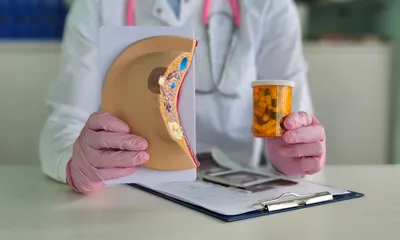Inflammation
-
Description
-
Signs & Symptoms
-
Anatomy
-
Cause
-
Diagnosis
What is Inflammation?
Inflammation is an immune system response causing site swelling, pain, heat, and skin redness in joints or tissue of the body. With inflammatory diseases like arthritis the inflammation causes the same swelling and pain but will also cause joint immobility. Inflammation will also occur if there is a major injury to the body. Arthritis, psoriasis, and IBD (inflammatory bowel disease) are autoimmune diseases and chronic inflammatory conditions.
The other type of inflammation is acute inflammation. Injury, exposure to allergens, and infections are examples of acute inflammation. Subacute inflammation is the transformational period between acute and chronic inflammation and can last up to 6 weeks. Recurring episodes of acute inflammation can cause a chronic inflammatory response.
What Causes Inflammation?
Inflammation is often the result of the immune system mistaking cells and tissues in the body as foreign substances that have entered the body and starting to send white blood cells to attack them. This is what happens with chronic conditions like arthritis, IBD, psoriasis, and bursitis. People with higher inflammatory marker levels in their body because of type 2 diabetes, metabolic syndrome, heart disease, or obesity are more likely to have inflammation and have it worse when it occurs.
People may be more hypersensitive to allergens when they are young, and this is often the case with inflammation in the eyes and sinuses because of rhinitis and being allergic to pollen. Joint inflammation is more common as people get older, and a diet that is heavy with unhealthy fats and sugar will also contribute to a person having more issues with pain and stiffness from inflammation.
Persistent acute inflammation can lead to chronic inflammation, as is the case when repeated injuries to the same joint lead to the joint becoming arthritic.
Inflammation Symptoms
Chronic inflammation symptoms will be pain, stiffness, and immobility, while for acute inflammation there are five key indicators – pain, swelling, heat, redness, and loss of function. There can be other minor signs too like tiredness and recurrent fever, and it is possible to have chronic inflammation occurring without symptoms. Swollen lymph nodes can also be a sign of it, and when inflammation affects metabolism a person may experience weight gain or weight loss.
Different conditions will have different inflammation symptoms. For IBD symptoms will be diarrhea, stomach pain, cramping, bloating, and anemia. Joint stiffness and swelling will be the primary ones for bursitis like they are for rheumatoid arthritis, but with bursitis the pain can be pronounced and onset quickly.
Inflammation Treatment
The most conventional approach to inflammation treatment is to use Mobic or Relafen among many NSAID (non-steroidal anti-inflammatory drug) medications. OTCs like aspirin, ibuprofen, and naproxen are NSAIDs too. For asthma or allergies causing inflammation an antihistamine or an asthma maintenance inhaler like the Symbicort inhaler will mediate the inflammatory response that causes the airway to constrict during asthma attacks.
Corticosteroid medications are also used to treat inflammation when it occurs because of arthritis, asthma, lupus, and sarcoidosis. Ones like Diprolene will often be prescribed if the person has skin itchiness, rash, or swelling because of inflammation. There can be natural approaches too, and an anti-inflammatory diet may be a part of what people want to consider for inflammation treatment.
Foods that are good for anti-inflammatory benefits are fatty fish, berries and cherries, mushrooms, broccoli, avocados, tomatoes, green tea, and some spices like turmeric and ginger. Regular physical exercise and stress management can also be helpful to reduce the severity of chronic inflammation.
Signs & Symptoms
- Redness
- Heat
- Swelling
- Pain
- Loss of function
- Fatigue
- Fever
- Malaise
- Stiffness
- Joint pain
Anatomy
- Skin
- Joints
- Muscles
- Blood vessels
- Immune system
- Organs
- Connective tissues
Cause
- Infections (bacterial, viral, fungal)
- Injuries
- Autoimmune disorders
- Chronic diseases (e.g., arthritis)
- Allergies
- Toxins
- Obesity
- Poor diet
- Smoking
- Excessive alcohol consumption
Diagnosis
- Physical examination
- Medical history review
- Blood tests (CRP, ESR)
- Imaging tests (X-ray, MRI, CT scan)
- Ultrasound
- Biopsy
- Allergy tests
- Autoantibody tests
- Joint fluid analysis



